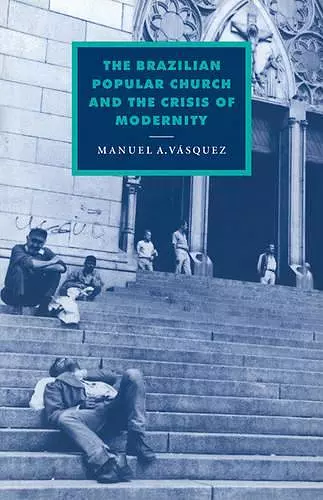The Brazilian Popular Church and the Crisis of Modernity
Format:Paperback
Publisher:Cambridge University Press
Published:27th Nov '08
Currently unavailable, and unfortunately no date known when it will be back
This paperback is available in another edition too:
- Hardback£91.99(9780521585088)

This 1997 book is an incisive study of progressive Catholicism and the threats it faces in Latin America.
This incisive 1997 study examines the fate of progressive Catholicism in Brazil. It traces the development of Latin American liberation theology and explores recent interactions between politics, society and religion, arguing that the current threat to progressive Catholicism is part of a wider contemporary crisis.This 1997 study explores one of the most dramatic current interactions between religion and politics: the development of progressive Catholicism in Latin America. In particular, it examines economic, social and religious obstacles to progressive theology in Brazil. This 'popular' church built a utopian vision of social emancipation, drawing on Catholic social thought, humanistic Marxism and existentialism. It was a major democratizing force as Brazil emerged from dictatorship in the late 1970s. In the 1980s, however, the popular appeal of progressive Catholicism came under threat. Focusing on a Catholic community near Rio de Janeiro, Manuel A. Vásquez's incisive study shows how economic and political changes have affected religious practices, and argues that the plight of progressive Catholicism in Brazil forms part of a wider crisis of modernity and of humanist discourses.
"This is a significant contribution to the study of the Brazilian Roman Catholic Church which not only provides a rich analysis, but also an illustrative example of an approach which seeks to relate the case study method...to wider theoretical issues.... This work offers a concise definition of the modernist utopian project, a clear and brisk survey of the `popular church's' ideological...and theological bases on the socialist version of the Western modernist utopia, all skillfully set in the context of the institutional Church and the related internal and external ecclesiastical pressures on the national and international levels. This careful and provocative work is a worthy addition to the Cambridge Studies in Ideology and Religion. It fills a lacuna in scholarly work on the Brazilian church...." Iain S. Maclean, H-Net Reviews
"What Vásquez has to say offers a good guide to a rethinking of liberation theology." Books & Culture
"Vásquez's excellent work...pays close attention to the larger context: theological and ideological, political and economic. he thoughtfully and powerfully engages the vast literature of the basse community movement. His nuanced study attends to the various internal and external factors that have contributed to the decline of the popular church. He succeeds in demonstrating the overwhelming capacity of late capitalism, especially as it is manifested in Brazil, to obstruct and challenge utopian, emancipatory projects." Koinonia
"Throughout this work the author clearly articulates his thoretical and methodological presuppositions...this is a well-written, valuable study." Dana Sawchuk, Method & Theory in the Study of Religion
"This is a useful and important project, and the author's consistent attention to it helps him to identify the ways in which local social action can satisfy needs, and resituate individuals in the context in which they live." Church History
ISBN: 9780521090865
Dimensions: 216mm x 140mm x 18mm
Weight: 410g
320 pages